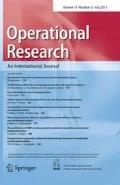Abstract
In this paper, we introduce the concepts of invexity, quasi-invexity and pseudo-invexity for interval-valued functions in parametric form. Sufficient optimality conditions for a class of interval-valued optimization problems are derived for feasible solution to be an efficient solution under proposed invexity assumptions. Furthermore, we formulate Wolfe and Mond–Weir type duals and establish appropriate duality theorems in order to relate the efficient solutions of primal and dual programs. Some examples are also constructed to illustrate the proposed invexity and weak duality theorems.
Similar content being viewed by others
References
Allahdadi M, Nehi HM (2013) The optimal solution set of the interval linear programming problems. Optim Lett 7:1893–1911
Bhurjee AK, Panda G (2012) Efficient solution of interval optimization problem. Math Methods Oper Res 76:273–288
Bhurjee AK, Panda G (2013) Nonlinear fractional programming problem with inexact parameter. J Appl Math Inform 31:853–867
Bhurjee AK, Panda G (2014) Sufficient optimality conditions and duality theory for interval optimization problem. Ann Oper Res. doi:10.1007/s10479-014-1644-0
Chalco-Cano Y, Lodwick WA, Rufian-Lizana A (2013) Optimality conditions of type KKT for optimization problem with interval-valued objective function via generalized derivative. Fuzzy Optim Decis Mak 12:305–322
Chinneck JW, Ramadan K (2000) Linear programming with interval coefficients. J Oper Res Soc 51:209–220
Hladík M (2011) Optimal value bounds in nonlinear programming with interval data. TOP 19:93–106
Ishibuchi H, Tanaka H (1990) Multiobjective programming in optimization of the interval objective function. Eur J Oper Res 48:219–225
Jana M, Panda G (2014) Solution of nonlinear interval vector optimization problem. Oper Res Int J 14:71–85
Jayswal A, Stancu-Minasian IM, Ahmad I (2011) On sufficiency and duality for a class of interval-valued programming problems. Appl Math Comput 218:4119–4127
Jiang C, Han X, Liu GR, Liu GP (2008) A nonlinear interval number programming method for uncertain optimization problems. Eur J Oper Res 188:1–13
Karmakar S, Bhunia AK (2014) An alternative optimization technique for interval objective constrained optimization problems via multiobjective programming. J Egypt Math Soc 22:292–303
Lodwick W (2007) Interval and fuzzy analysis: a unified approach. In: Hawkes Peter W (ed) Advances in imaging and electron physics, vol 148. Academic Press, London, pp 76–192
Mahapatra GS, Mandal TK (2012) Posynomial parametric geometric programming with interval valued coefficient. J Optim Theory Appl 154:120–132
Moore RE (1979) Methods and applications of interval analysis. SIAM, Philadelphia
Mond B (2009) Mond–Weir duality. In: Pearce C, Hunt E (eds) Structure and applications. Springer optimization and its applications 32, Chapt. 8, Springer Science + Business Media, LLC, pp 157–165. doi:10.1007/978-0-387-98096-6_8
Sun Y, Xu X, Wang L (2014) Duality and saddle-point type optimality for interval-valued programming. Optim Lett 8(3):1077–1091
Urli B, Nadeau R (1992) An interactive method to multiobjective linear programming problems with interval coefficients. INFOR 30:127–137
Wu H-C (2011) Duality theory in interval-valued linear programming problems. J Optim Theory Appl 150:298–316
Zhang J, Liu S, Li L, Feng Q (2014) The KKT optimality conditions in a class of generalized convex optimization problems with an interval-valued objective function. Optim Lett 8(2):607–631
Zhou H-C, Wang Y-J (2009) Optimality condition and mixed duality for interval-valued optimization. In: Fuzzy information and engineering, vol 2, “Advances in intelligent and soft computing”, vol 62, Proceedings of the third international conference on fuzzy information and engineering (ICFIE 2009), Springer, pp 1315–1323
Acknowledgments
The authors thank the anonymous reviewers for their valuable comments which help to improve the quality of the paper.
Author information
Authors and Affiliations
Corresponding author
Additional information
This research is financially supported by Department of Science and Technology, New Delhi, India through Grant No. SR/FTP/MS-007/2011.
Rights and permissions
About this article
Cite this article
Jayswal, A., Stancu-Minasian, I., Banerjee, J. et al. Sufficiency and duality for optimization problems involving interval-valued invex functions in parametric form. Oper Res Int J 15, 137–161 (2015). https://doi.org/10.1007/s12351-015-0172-2
Received:
Revised:
Accepted:
Published:
Issue Date:
DOI: https://doi.org/10.1007/s12351-015-0172-2


